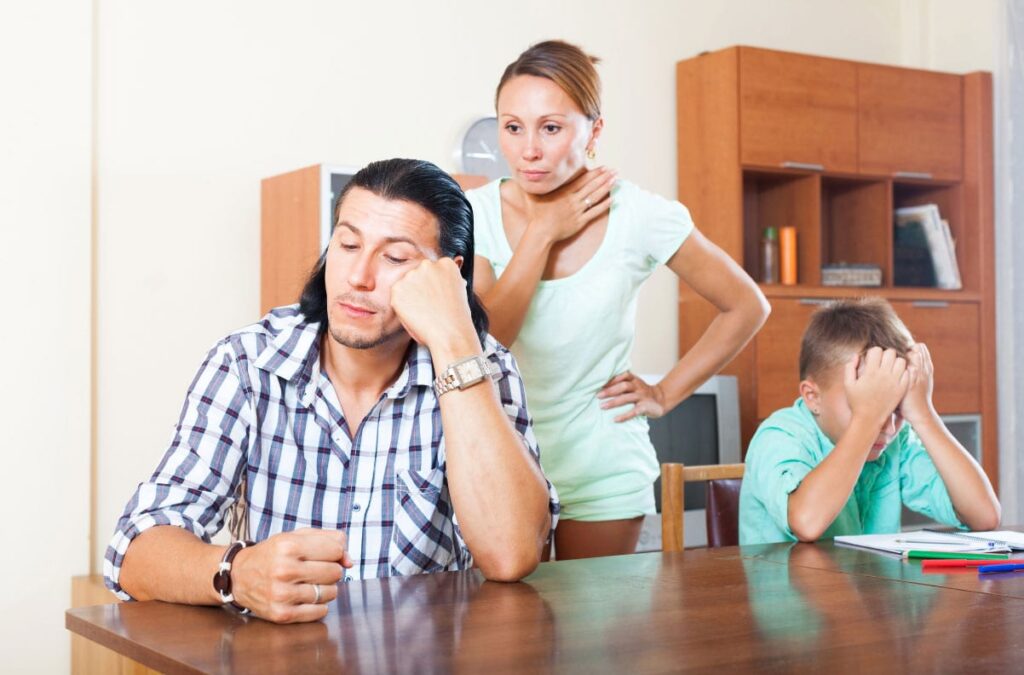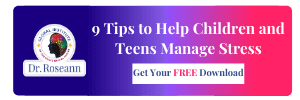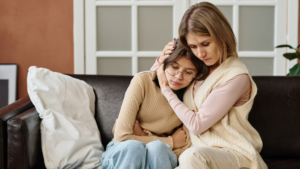Are You A Stressed Out Parent?
“I am feeling so stressed right now!”
Does this sound familiar? If so, you’re not alone. People of all ages are impacted by stress every day and kids are especially stressed during this pandemic. The pandemic wall is hitting parents teaching their children from home hard. Homeschooling, working virtually, health and safety concerns, and parenting can all be stressors that make us feel overwhelmed and out of control. Due to the quarantine and restrictions, most of us aren’t spending much time with people we are used to seeing like friends, coworkers, and relatives. Stress has a way of creeping up on us when we are trying our best to get through tough times.
I know you're worried about your child’s stress and ability to cope. That is why I created this FREE parent resource to help parents support their kids' stress!
What is The Toll of The Pandemic on Children's Mental Health and Just How Stressed Are Kids in 2021?
Before we talk about children’s mental health during the pandemic, we have to talk about how overwhelmed parents are. According to The American Psychological Association’s Stress in America™ survey, parents are struggling more than normal. The additional responsibilities have left parents feeling overwhelmed and isolated. With the strain on families and general disruption of education, seven out of ten parents (70%) report that family responsibilities are a significant source of stress in their daily life. In addition, the majority (63%) say the COVID-19 pandemic made the 2019-20 school year extremely stressful for them.
Stress and Its Impact on the Brain
So, how does stress affect a child’s brain?
It actually does in the same way that it affects an adult’s brain except for the fact that a child’s brain is going through a critical development period. This means it is even more important to regulate children and teen’s stress because that stress can significantly affect the development of brain structures.
Okay, you may be really worried right now but think of it in a positive way… what YOU as a parent do right now matters. You can do a TON to help your child’s brain and body cope with stress and it will actually positively impact the development of their brain!
When you have a stress hyperactivation of the nervous system™, your frontal lobes shut down, and it becomes virtually impossible to have rational thoughts. (Yep, that is why your child or teen is like tyrant when he or she is “in the red.”) The brain is designed to go ‘offline,’ so you can act without bothering to think.
“The body’s stress response is there to protect us from actual stressors. The problem is that in today’s stressful world, our nervous system never seems to catch a break—we are constantly bombarded with stress.” Dr. Roseann
The hypothalamic pituitary adrenal (HPA) axis is our central stress response system and involves the interaction and interplay between the hypothalamus, pituitary gland, and adrenal glands. It is this system that triggers stress hormones that impact the autonomic nervous system, which regulates how we respond to stress. The autonomic nervous system has two components, the sympathetic nervous system and the parasympathetic nervous system.
So how does our autonomic nervous system help us manage stressors? A healthy, regulated autonomic nervous system will demonstrate regular oscillations between the sympathetic (energizing) and parasympathetic (relaxing) branches of the brain. A healthy nervous system will idle closer in the calmer, more “chilled-out” parasympathetic state and when faced with a stressor will activate the sympathetic dominant state. Even after dysregulating circumstances such as an activity that increases your heart rate, a “near death” experience, or some other jolting experience, your autonomic nervous system should return to normal as you calm down.
How Does Stress Impact Mental Health?
Stress impacts how our neurotransmitters and brain waves work; both of which greatly impact mental health.
When a stressor occurs, brain structures jump into action and prepare for a crisis, causing the fight, flight, and sometimes freeze response. That stress causes a release of hormones which produce physiological changes within the central nervous system (CNS). The body will then shift into a primitive survival fight-or-flight mode when it has a real or perceived stressor and move all its resources toward fighting off or fleeing from an “enemy” (Rosen & Donley, 2006).
Problems occur when we are always stressed. An overly stressed nervous system is not only bad for our mental health but our physical health, too. Now more than ever, families are feeling the effects of prolonged stress.
Are you concerned about your child’s stress during the pandemic?
Have you found yourself searching the internet for something along the lines of, “How can I help my child manage stress”? If so, don’t worry because that is very common during these very stressful times. We are all feeling many emotions right now on top of all the stress of being in quarantine for several months.
Teaching kids how to cope with stress is essential for their mental health, not only during the pandemic, but when it comes to their futures as well. As I often talk about, a Resiliency Mindset™ – how one views, manages, and recovers from stress- has been linked to feelings of overall wellness. This involves having a more regulated nervous system and learning ways of handling stressful situations. When kids practice healthy stress management techniques, it becomes easier for them to pay attention, think clearly, listen, and connect with others.
What is the difference between stress and anxiety?
If you're worried that your child or teen is stressed, then they probably are. Children tend to show their stress and anxiety behaviorally due to the lack of words they have to accurately express their emotions. Some behavioral signs of stress can include stomachaches, headaches, sleep problems, frequently needing to use the bathroom, and irritability. They may even be anxious or have clinical anxiety. To learn more about the difference between stress and anxiety, watch my YouTube video, Is It Stress or Anxiety?
Is Stress Affecting My Child’s Ability To Pay Attention, Learn, and Think?
So, how does stress affect learning and memory? Does stress affect attention?
Ah, the answer is a BIG YES! Stress does affect the learning, memory, and attention of children and teens. Remember, when we have stress hyperactivation of the nervous system™, our thinking process is interrupted. This causes our ability to pay attention, learn and communicate properly to be interrupted too.
Ok, all this talk of how stress affects your child or teen’s mental health is leaving you more stressed! Well, I got you covered! I have created a FREE parenting resource for you to help children and teens manage stress!
Are you looking for help for your child’s or teen’s behavior?
Boy, the world is stressful right now (and it has been for a long time!). Of course, you are worried about your child’s mental health! Your child may be struggling with focus, stress, mood, behavior, emotions, or socially and you aren’t sure what to do about it and you feel STUCK… Well, Dr. Roseann is here to show you how to GET UNSTUCK!
As a licensed therapist and certified psychologist, as well as a special needs mom herself, Dr. Roseann knows what it is like to search for ways to help your child’s attention, learning, and behavior and still see your child struggle. So, if you’ve gone down the Google MD and ineffective medication and therapy rabbit hole, it is time to get support from Dr. Ro who can help you help your child to be focused, calm, and feel good about themselves.
Want to work with Dr. Roseann, so you can turn your child’s behavior around and GET UNSTUCK?
Sign up for the FREE Get Unstuck Parenting Summit, where you get access to amazing speakers and parenting resources. You can get her books for parents and professionals, including: It’s Gonna Be OK™: Proven Ways to Reverse Your Child’s Mental Health Issues With Natural Therapies, Teletherapy Toolkit™ and Brain Under Attack: A Resource For Parents and Caregivers of Children With PANS, PANDAS, and Autoimmune Encephalopathy.
Want to work with Dr. Roseann personally? She sees people at her Ridgefield, CT center usi=g neurofeedback, biofeedback, and psychotherapy to turn behavior around, as well as does neurofeedback and coaching remotely. She also does small group special needs parent coaching though her Get Unstuck Program™, where Dr. Ro walks parents through how to reduce and reverse mental health issues to break free from those barriers that are holding your child and family back so they can be calm, making connections, and getting good grades. She has also reached billions through her dozens of media appearances on her mission to, ‘Change the way we view and treat children’s mental health™.”
The best way to find out if we can help you is to apply to work with us, so we know you are ready for the powerful change that lies ahead.
Sign up for her Professional Webinars and CE-Based Courses or purchase her book, Teletherapy Toolkit™: Therapist Handbook for Treating Children and Teens.
If you are a business or organization that needs proactive guidance to support employee mental health or an organization looking for a brand representative, check out Dr. Roseann’s professional speaking page to see how we can work together.
Dr. Roseann is a Children’s Mental Health Expert and Therapist who is regularly featured on media outlets including, CBS, NBC, FOX News, PIX11 NYC, The New York Times, FORBES, Business Insider, USA Today, CNET, Marth Stewart, and PARENTS.
She is the founder and director of The Global Institute of Children’s Mental Health and Dr. Roseann Capanna-Hodge. Dr. Roseann is a Board Certified Neurofeedback (BCN) Practitioner, a Board Member of the Northeast Region Biofeedback Society (NRBS), Certified Integrative Medicine Mental Health Provider (CMHIMP) and an Amen Clinic Certified Brain Health Coach. She is also a member of The International Lyme Disease and Associated Disease Society (ILADS), The American Psychological Association (APA), Anxiety and Depression Association of America (ADAA) National Association of School Psychologists (NASP), International OCD Foundation (IOCDF) International Society for Neurofeedback and Research (ISNR) and The Association of Applied Psychophysiology and Biofeedback (AAPB).
© Roseann-Capanna-Hodge, LLC 2021











